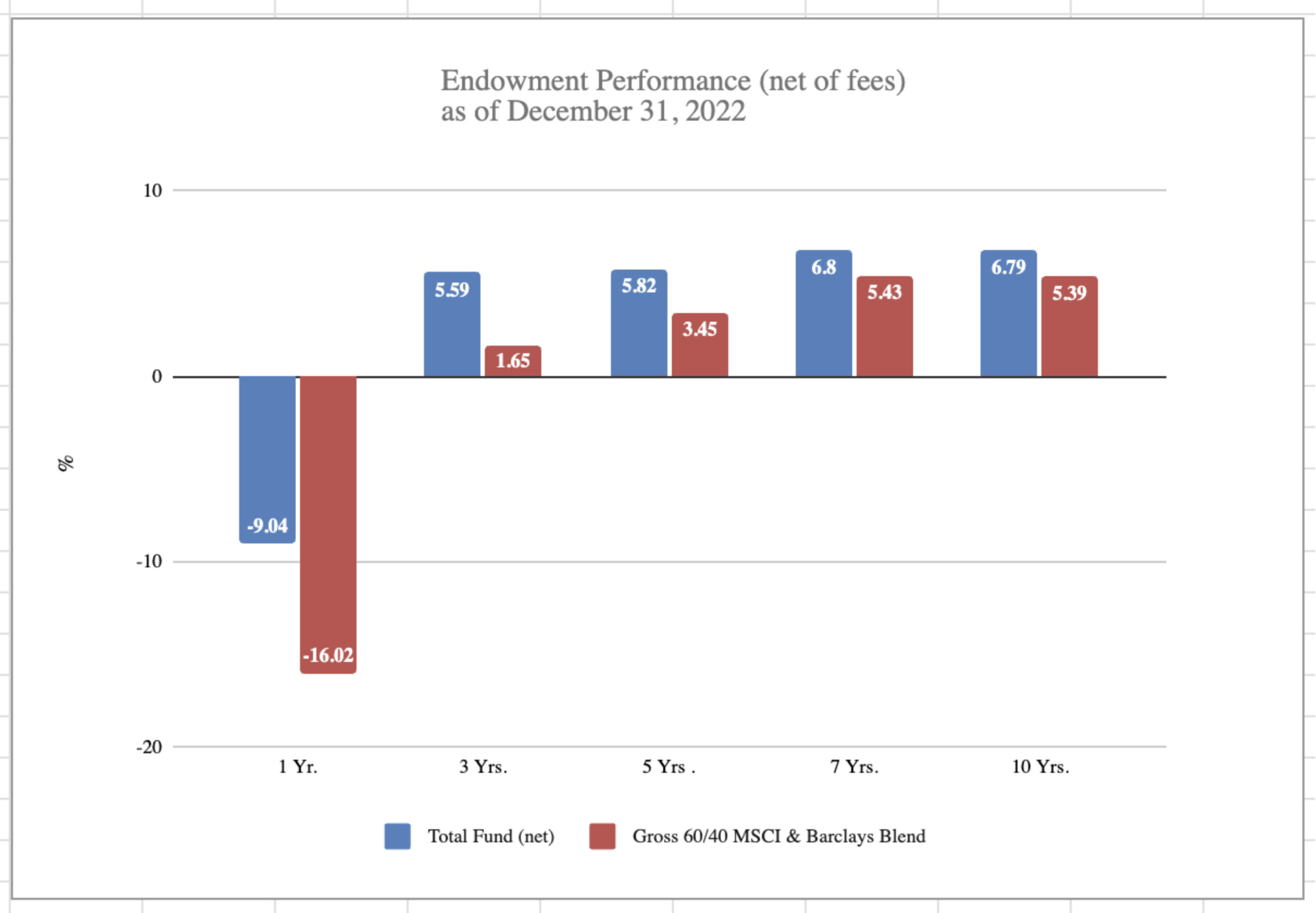That's Age-Friendly!
We can intentionally make care and all aspects of society age-friendly.
A Message From Our Leadership
The John A. Hartford Foundation is committed to improving the care of older adults by making all aspects of society age-friendly, from health systems to community-based services. We’ve made exciting advancements this year to improve nursing home care, support family caregivers, and better establish how we talk about end-of-life and serious illness care.
That’s Age-Friendly!
Our close collaboration with grantees and partners made 2022 a watershed year for The John A. Hartford Foundation, marked by intention and tenacity leading to large-scale improvements in the care of older adults. We supported the development and release of the most comprehensive recommendations to improve nursing home care since the 1980s, a first-ever national strategy to support family caregivers and a new paradigm for talking to the public about end-of-life and serious illness care.
You’ll often hear our Trustees and staff pointing to positive shifts resulting from our efforts, noting: “That’s age-friendly!” It’s why we chose this phrase as our theme for the 2022 Annual Report—it encapsulates what we do and what we stand for.
That’s age-friendly! serves as a reminder that we can intentionally make care and all aspects of society age-friendly, from our health systems, to public health, to community-based services. Age-friendly care extends to supporting family caregivers of older adults and centers on what matters to older people and their families, which is especially critical during serious illness and at the end of life.
Age-friendly care is equitable care. The Age-Friendly Health Systems initiative provides guidance on how to address inequities. We are supporting new generations of leaders of color through the American Society on Aging’s ASA RISE program program to shape inclusive aging policies and programs at the “local, state and federal levels”. We continue core support grants to national advocacy organizations that are tenacious and undaunted in the pursuit of health equity for marginalized older adults.
Our 2022 grants intentionally linked our priority areas—such as bringing the 4Ms of age-friendly health care to family caregivers and integrating serious illness messaging in Age-Friendly Health Systems sites. We saw connections continue to strengthen between our programs that promote age-friendly care in specific settings, such as emergency departments, surgical units, nursing homes and residential homes. Our grants demonstrate a range of dynamic approaches that effectively promote age-friendly care through new tools and resources. Many of our grants are fueling federal and state policy change.
While there were many highlights from 2022, three particularly demonstrate the power of intention and tenacity in making care for older adults age-friendly:
- The National Academies nursing home report and creating the Moving Forward Nursing Home Quality Coalition
The bold National Imperative to Improve Nursing Home Quality report released in April 2022 represents a new dawn for nursing homes. The report’s comprehensive set of feasible yet transformational recommendations in critical areas such as workforce and financing are backed by evidence and experts, including residents and family caregivers. To ensure the recommendations move to action, we funded the Moving Forward Coalition. The coalition launched with 100 participants and today engages 800 members including advocates, nursing home staff, operators, researchers, residents and family members. Committees are prioritizing actions that will be taken in the near and longer term to radically improve nursing home care throughout the country.
- RAISE National Strategy to Support Family Caregivers
A true cross-sector partnership, the RAISE National Strategy represents decades of work to elevate the needs of family caregivers, and by extension the direct care workers with whom they work so closely. The strategy outlines actions that 15 federal agencies will take, and provides clear and concrete steps that states, health systems, employers, nonprofits and philanthropy should enact to meet the needs of caregivers as the critical lifelines they are. We continue our close partnership with the Administration for Community Living and the National Academy for State Health Policy to implement this whole-of-society strategy.
- Increasing public understanding of serious illness and end-of-life care
Improving serious illness and end-of-life care is a hallmark issue for us, especially as it relates to increasing conversations about ‘what matters’ to older adults. This is why we’re so proud of the new Serious Illness Messaging Toolkit, which uses consumer-informed messaging to help clinicians and others engage in understandable discussions about advanced care planning, palliative care and hospice. Supported by a dedicated coalition of 12 national organizations, this easy-to-use toolkit is a gamechanger that will help the field engage the public in new and more effective ways.
As we look back on 2022 and mark three somber years since the start of a horrific pandemic, we are fortunate to have emerged as an even more tenacious and nimble foundation. We are driven by a fervent desire to achieve our mission and empowered by our forward-thinking Trustees, whose oversight encourages and strengthens our impact.
We recognize the considerable contributions and celebrate the retirement of board member Audrey McNiff in 2022 and graciously thank Peggy Wolff as she completed her term as board Chair. In June of last year, we presented our dear colleague Marie Bernard, MD, chief officer for scientific workforce diversity at the National Institutes of Health, with The John A. Hartford Foundation Trustees Award for her steadfast dedication to improving the lives of older adults through research, education and clinical practice improvement.
Thank you for another strong year focused on doing what’s needed to improve the lives and care of older adults, no matter how long it takes or what shape it forms.
That’s our intention, and that’s age-friendly!
|
|
 John R. Mach, Jr., MD John R. Mach, Jr., MDChair |
Prioritizing What Matters:
Age-Friendly Health Systems
Age-friendly care must be reliably delivered wherever and whenever older adults need it, from their homes to long-term care facilities to the emergency department and beyond. Collaboration between health systems, community-based services and public health create an ecosystem where everyone can get age-friendly care.
By promoting standards, creating tools and offering training to clinicians and service providers, we are expanding age-friendly care based on what works and what matters to older adults and their caregivers. That’s age-friendly!
Age-Friendly Health Systems
Featured Milestones
JAHF and Institute for Healthcare Improvement publish a book, Age-Friendly Health Systems: A Guide to Using the 4Ms While Caring for Older Adults.
The National Academies of Sciences, Engineering, and Medicine releases the first comprehensive report on nursing home quality in 35 years.
USAging’s Business Institute debuts an evidence bank to help community-based organizations show their value as contracting partners to health care entities.
National Collaboratory to Address Elder Mistreatment develops an emergency department toolkit to improve screening for elder mistreatment.
Trust for America’s Health launches an updated Age-Friendly Public Health Systems Recognition Program.
Moving Forward Nursing Home Quality Coalition forms to advance recommendations from the National Academies report, The National Imperative to Improve Nursing Home Quality.
Supporting the Backbone of
Health Care:
Family Caregiving
Family caregivers play a critical role in caring for millions of older adults, and without support, they and those they care for can be at risk of harm. The needs of caregivers must be addressed for care to be age-friendly.
We recognize the importance of caring for those who care, and to do so, we work across diverse sectors to change policy and support family caregivers with resources and assistance. That’s age-friendly!
Family Caregiving
Featured Milestones
Diverse Elders Coalition offers free training for health care, social service and aging professionals who want to better serve diverse family caregivers of older adults.
The Coalition for Care Partners highlights the developing, testing and scaling of consumer-oriented technologies to engage care partners.
Center for Health Care Strategies tool guides states interested in pursuing cross-sector partnerships to strengthen services for family caregivers.
U.S. Department of Health and Human Services publishes the 2022 National Strategy to Support Family Caregivers.
RUSH University Medical Center shares learnings from their Age-Friendly Health Systems caregiver intervention program pilot.
Helping People Live Well at Every Stage:
Serious Illness &
End of Life
There is no time when age-friendly care is more important than during serious illness and at the end of life. But too often, the care we receive is not aligned with our goals, values and preferences.
With our partners, we help people understand and discuss palliative and hospice care. We help clinicians communicate its value. We help transform policies and practice so that care reflects what matters to you—always. That’s age-friendly!
Serious Illness & End of Life
Featured Milestones
The National Academy for State Health Policy launches a multimedia explainer to help policymakers educate the public about palliative care.
FAIR Health creates a dedicated webpage for older adults and caregivers with new shared decision-making tools.
Serious Illness and End-of-Life Funders Community celebrates five years of collaboration in partnership with Grantmakers In Aging.
Center to Advance Palliative Care convenes a national briefing on its research findings on access to palliative care for Black patients with serious illness.
The Serious Illness Messaging Toolkit launches with resources for public messaging about serious illness care.
Hospice and Palliative Nurses Association announces JAHF’s Amy Berman as the HPNA Champion Award Winner.
Grants
We funded a robust roster of 30 new grants totaling $41,804,459 to improve the care of older adults. The Foundation made $24,506,645 in payments to existing grants in 2022.
New Grants in 2022
View Grants Awarded by Quarter
First Quarter 2022
Gerontological Society of America
Establishing The National Center to Frame Aging: Advancing a New Conversation about Aging in America
$1,143,891
Health Research and Educational Trust
Spreading the Age-Friendly Health Systems Social Movement
$2,293,409
USAging
Aging and Disability Business Institute, Phase III: Advancing Equity and Excellence through Sustainable Networks and Partnerships
$2,880,522
NORC at the University of Chicago
Evaluation Design Plan for The Center for Discovery
$94,690
Second Quarter 2022
AARP Foundation
Advancing Action: A Reimagined and Enhanced State Scorecard on Long-Term Services and Supports for Older Adults, People with Physical Disabilities, and Family Caregivers
$100,000
Icahn School of Medicine at Mount Sinai
The Center to Advance Palliative Care: Achieving Sustainable Change in the Care of Older Adults with Serious Illness
$1,960,000
Institute for Healthcare Improvement
Establishing an Age-Friendly Health Care Package for State Master Plans for Aging
$1,388,406
LeadingAge
Action to Improve Nursing Home Quality
$1,165,982
National PACE Association
PACE 200K: Building for Sustainable Growth and Quality
$469,972
Project HOPE - The People-to-People Health Foundation / Health Affairs
Publishing and Disseminating Lessons on Innovations in Health Care to Support Age-Friendly Health
$905,800
Third Quarter 2022
ADvancing States
Maximizing the Impact of American Rescue Plan Act Home and Community-Based Funding - State Support and Learning Project
$465,000
National Academy for State Health Policy
Building State Policies to Improve Care for People with Serious Illness
$924,816
Henry J. Kaiser Family Foundation
The 2022 - 2023 Older Adult Reporting Project
$302,001
Institute for Healthcare Improvement
Age-Friendly Health Systems Movement - Stage 3: Embedding, Deepening and Sustaining 4Ms Care in Health Care Systems
$7,578,812
Research Foundation for Mental Hygiene
The Health and Aging Policy Fellows Program: A Pipeline for Leaders in Aging Policy
$3,026,263
RUSH University Medical Center
Ready, Willing and Able: Caring for Caregivers in Age-Friendly Health Systems - Dissemination Phase
$1,854,890
University of Washington
Disseminating Evidence-Based Messaging about Palliative & End-of-Life Care for Persons Living with Serious Illness
$2,900,000
Fourth Quarter 2022
American Academy of Home Care Medicine
Moving and Scaling Home-Based Primary Care, Phase III: Quality, Training, Advocacy and Policy
$361,199
Center for Medicare Advocacy
General Operating Support: Advancing Equity for Older Adults
$300,000
Community Catalyst
General Operating Support: Advancing Equity for Older Adults
$300,000
Duke University
Moving and Scaling Home-Based Primary Care, Phase III: Quality, Training, Advocacy and Policy
$325,000
Emergency Medicine Foundation
$996,273
Home Centered Care Institute
Moving and Scaling Home-Based Primary Care, Phase III: Quality, Training, Advocacy and Policy
$805,263
Johns Hopkins University
Moving and Scaling Home-Based Primary Care, Phase III: Quality, Training, Advocacy and Policy
$1,398,130
Justice in Aging
$300,000
National Alliance for Caregiving
$985,851
National Rural Health Association
$575,000
University of North Carolina at Chapel Hill
$1,999,959
Yale University
$1,031,333
Yale University
$2,971,997
Financial Summary
The Foundation’s investment portfolio was valued at approximately $615 million at year-end 2022, reflecting a decline of approximately $64 million before disbursement for grants, administrative expenses and taxes totaling $32 million during the year.
2022 was an extremely challenging year for financial markets with both stocks and bonds suffering double-digit losses. The extent to which both stocks and bonds sold off was rare and has only occurred 2% of the time in history dating back to 1926. This was mainly driven by the Federal Reserve’s commitment to aggressively fight inflation by raising interest rates, and the increased probability of a U.S. recession. The U.S. market—represented by the S&P 500 index—ended the year down 18.1% while the U.S. fixed-income market, measured by the Bloomberg U.S. Aggregate index, declined 13.0% in 2022. International equities—represented by MSCI ACWI ex USA index GD—ended the year down 15.6%.
Despite the double-digit losses for 2022, the Foundation’s portfolio returned negative 9% during the year. The alternative investments—hedge funds, private equity and private credit—recorded positive returns, helping hedge the portfolio against volatility. To that end, the portfolio not only delivered solid relative performance against public markets, but also held up well against its peers. This is evidenced by the 33rd percentile rank in Northern Trust’s foundation and endowment universe for the one-year performance.
Over the course of 2022, the Foundation rebalanced its investments to its long-term target allocation and within each asset class in response to market conditions and the Foundation’s spending needs. At the end of the year, the portfolio’s asset mix was 47% long-only equities, 15% fixed-income, 2% cash, 14% hedge funds and a total of 22% in private assets. In comparison, the portfolio was comprised of 51% public equities, 17% fixed income, 2% cash, 14% hedge funds and 16% non-marketable alternatives as of the end of 2021. Furthermore, the strategic asset allocation was revised at the end of 2022 to increase the probability of maintaining the portfolio’s purchasing power over the long run without impacting the risk target of the portfolio.
2022 also marks the 10th anniversary of Goldman’s advisory services for the Foundation. The endowment, which was valued at $505 million at the end of 2012, has grown by approximately $110 million after total spending of $268 million (in nominal value) during the last ten years. Under their guidance, our disciplined, prudent investment approach coupled with robust diversification has served us well; the portfolio has consistently outperformed its Reference Benchmark (60% MSCI All Country World ND Index/40% Barclays U.S. Aggregate) for 2022, and the trailing 3, 5, 7 and 10 years.

Furthermore, with Goldman’s assistance, the Foundation has proactively redesigned its asset allocation guidelines while maintaining a moderate-plus-risk portfolio diversified across a wide array of asset classes and strategies. As a result, the portfolio has experienced significant asset allocation changes since 2012, a transition of assets from alternative investments (hedge funds and private assets) into traditional asset classes (long-only equity and fixed-income) during this period.

The Foundation’s investment objective continues to be securing maximum long-term total return on its investment portfolio to maintain a strong grants program, while assuring consistent growth of its assets at a level greater than the rate of inflation. Despite stubbornly high inflation and a challenging investment environment in 2022, we are pleased that the long-term performance of the Foundation’s portfolio—which had delivered an annualized net investment return of 8.2% in the past 35 years—has remained ahead of the average inflation (2.8%) plus spending rate (4.9%) for a total of 7.7% per year.
While the markets are expected to be less turbulent in 2023, we remain vigilant to a wide range of risks, including hotter-than-expected inflation data, which may trigger the Federal Reserve to further hike interest rates, the threat of a U.S. recession, the implications of China’s abandonment of its “zero-COVID” policy and the on-going Russia-Ukraine war. In this uncertain environment, we are confident that our customized strategic asset allocation—designed to ride out volatility and provide staying power in the event of geopolitical disruptions—will continue to enable us to withstand dramatic market swings in 2023 and beyond.
The Finance Committee and the Board of Trustees meet regularly with Goldman Sachs to review asset allocation, investment strategy and the performance of the underlying investments. Northern Trust Corporation is the custodian for all the Foundation’s securities.
A complete listing of investments is available for review at the Foundation’s offices. Audited financial statements were not completed in time for this publishing but will be available on the Foundation’s website in the summer.

Eva Cheng, CPA
Vice President, Finance
Trustees & Staff
2022 board of Trustees
- John R. Mach, Jr., Chair
- Elizabeth A. Palmer, Co-Vice Chair
- Earl A. Samson, III, Co-Vice Chair
- John H. Allen
- David Di Martino
- Liam Donohue
- Charles M. Farkas
- Audrey A. McNiff *
- Tripler Pell
- Nirav R. Shah
- Margaret L. Wolff
* Retired June 2022
2022 Staff
- Terry Fulmer, President
- Eva Cheng, Vice President, Finance
- Marcus Escobedo, Vice President, Communications and Senior Program Officer
- Rani E. Snyder, Vice President, Program
- Scott Bane, Program Officer
- Amy Berman, Senior Program Officer
- Alexa Cardamone, Office Manager
- Jane Carmody, Senior Program Officer
- JiHo Chang, Senior Program Associate and Senior Technology Advisor
- Clare Churchouse, Senior Communications Associate
- Barline Dambreville, Administrative Assistant
- Ximena Gallego, Communications Assistant
- Melida Galvez, Senior Accountant and Assistant Grants Manager
- Rutuma Gandhi, Accounting Manager
- Julianne McLean, Program Administrator / Travel Coordinator
- Jon Miller, Grants Manager
- Jennifer Phillips, Executive Assistant
- Nancy Wexler, Program Officer
Interns:
Eiman Ali, Teffin Benedict, Andrea Diep, Sofia Espinosa, Jessica Huang, Abby Maglich, Grace Morton, Rumaysa Sharif, Rebecca Slossberg
as of December 2022




